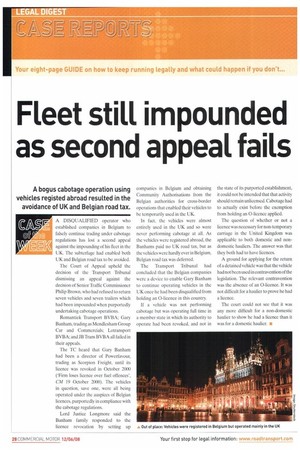Fleet still impounded as second appeal fails
Page 28

If you've noticed an error in this article please click here to report it so we can fix it.
A bogus cabotage operation using vehicles registed abroad resulted in the avoidance of UK and Belgian road tax.
A DISQUALIFIED operator who established companies in Belgium to falsely continue trading under cabotage regulations has lost a second appeal against the impounding of his fleet in the UK. The subterfuge had enabled both UK and Belgian road tax to be avoided.
The Court of Appeal upheld the decision of the Transport Tribunal dismissing an appeal against the decision of Senior Traffic Commissioner Philip Brown, who had refused to return seven vehicles and seven trailers which had been impounded when purportedly undertaking cabotage operations.
Romantiek Transport BVBA; Gary Branham. trading as Mendlesham Group Car and Commercials; Lotransport BVBA; and JB Trans BVBA all failed in their appeals.
The TC heard that Gary Banham had been a director of Powerfavour, trading as Scorpion Freight, until its licence was revoked in October 2000 (`Firm loses licence over fuel offences', CM 19 October 2000). The vehicles in question, save one, were all being operated under the auspices of Belgian licences, purportedly in compliance with the cabotage regulations.
Lord Justice Longmore said the Banham family responded to the licence revocation by setting up companies in Belgium and obtaining Community Authorisations from the Belgian authorities for cross-border operations that enabled their vehicles to be temporarily used in the UK.
In fact, the vehicles were almost entirely used in the UK and so were never performing cabotage at all. As the vehicles were registered abroad, the Banhams paid no UK road tax, but as the vehicles were hardly ever in Belgium, Belgian road tax was deferred.
The Transport Tribunal had concluded that the Belgian companies were a device to enable Gary Banham to continue operating vehicles in the UK once he had been disqualified from holding an 0-licence in this country.
If a vehicle was not performing cabotage but was operating full time in a member state in which its authority to operate had been revoked, and not in the state of its purported establishment, it could not be intended that that activity should remain unlicensed. Cabotage had to actually exist before the exemption from holding an 0-licence applied.
The question of whether or not a licence was necessary for non-temporary carriage in the United Kingdom was applicable to both domestic and nondomestic hauliers. The answer was that they both had to have licences.
A ground for applying for the return of a detained vehicle was that the vehicle had not been used in contravention of the legislation. The relevant contravention was the absence of an 0-licence. It was not difficult for a haulier to prove he had a licence.
The court could not see that it was any more difficult for a non-domestic haulier to show he had a licence than it was for a domestic haulier.
















































































































































































